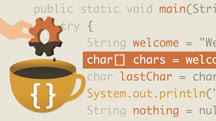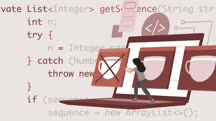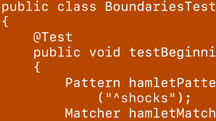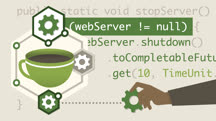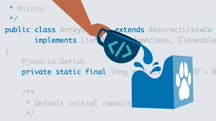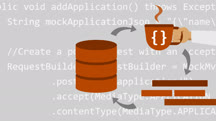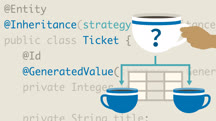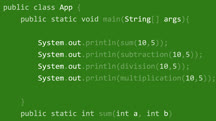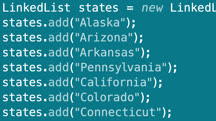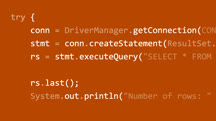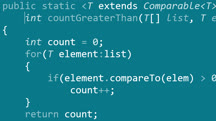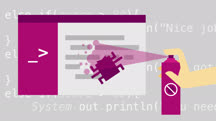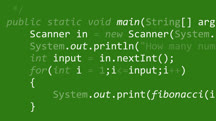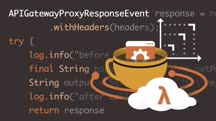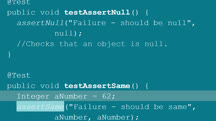کاتالوگ دورهها
طبقهها
نمایش 4,221 تا 4,240 مورد از کل 8,871 مورد.
Java Essential Training: Objects and APIs
Learn Java 9, in part two of our essential training series. Learn about debugging, creating custom classes, working with inheritance, and more.
Java Essential Training: Syntax and Structure
Get started with Java, the popular object-oriented programming language. Learn about basic Java syntax and the Java platform's fundamental architecture.
Java Exception Handling (232336)
As you build any application, you can’t just assume that everything will run as expected. There are so many things that could cause your applications to not function properly or even crash. This course aims to teach developers how to handle such unforeseen scenarios in applications. Join instructor Cecili Reid as she teaches you the different types of exceptions, how to handle exceptions, and how to test an application to ensure it handles exceptions as expected. Cecili uses a sample Spring Boot web app as a case study and walks through practical scenarios where you’d want to use exception handling in that application. She starts with an initial application that doesn’t have exception handling mechanisms, and as she walks through each concept, she shows you how to improve the application by applying the concepts taught in each chapter. Cecili also shares some best practices to follow when handling exceptions in your applications.
Java for Data Scientists Essential Training
Leverage Java in your data science career. Learn how to use Java for two components of data science—data engineering and data analysis.
Java Integration with .NET Framework
Discover how to use Javonet—a framework that was designed for native integration—to access and use .NET assemblies directly from a Java platform.
Java Memory Management
Learn how memory works in Java. In this hands-on course, explore fundamental concepts to help you optimize your code and quickly find and fix any memory errors that still occur.
Java Microservices with GraalVM
Learn how to develop more performant Java microservices using GraalVM and popular frameworks such as Micronaut, Helidon, Quarkus, and Spring.
Java Object-Oriented Programming (220198)
Are you familiar with Java but want to get the most out of your Java programs? In this course, Kathryn Hodge teaches the basics of object-oriented programming in Java, so you can write code that’s secure, scalable, and easier to troubleshoot. Kathryn begins by showing how object-oriented principles are embedded into the Java language from the first code file you create. She looks at how classes, instances, and constructors embody the idea of representing real-life objects in code. Kathryn not only shows how to apply object-oriented principles in your own programs, but also explains how Java leverages these principles behind the scenes. While many resources about object-oriented programming focus on abstract examples, the goal of this course is to get away from the abstract and focus more on practical examples of these principles in Java. Along with deep dives into the source code, this course also provides several challenges and solutions to help you apply what you’ve learned.
Java Persistence API (JPA): 1 The Basics
Learn how to work with the Java Persistence API (JPA), the standard for building Java enterprise applications that need to have persistent data.
Java Persistence API (JPA): 2 Inheritance and Querying
Learn more advanced uses of the JPA, including inheritance mapping strategies, Java Persistence Query Language (JPQL), the Criteria API, and more.
Java Platforms Compared: SE vs EE vs ME
Get a quick overview of the different flavors of Java—SE, EE, and ME—and find out which platform is right for your development workflow.
Java: Automated API Testing with REST Assured (232353)
There is demand for engineers who know how to automate API testing. In this course, instructor Angie Jones covers how to use REST Assured to make various types of API requests in Java, with and without additional data, and how to verify the response received from the API. Angie explains why API testing is necessary and why automating API testing is an efficient and effective approach to keeping your APIs healthy. She introduces you to the REST Assured testing library. Angie discusses the anatomy of an API request, then shows you how to make GET, POST, PUT, and DELETE requests. She describes how you can serialize data to send as part of the request. Angie explains how you can validate API responses and deserialize data received from the response.
Java: Build Automation with Maven
Maven makes Java programming easier! Learn how to use Maven for build automation, reporting, and document management.
Java: Data Structures
Explore different data structures in the Java language, and discover how you can leverage them to make your software more efficient.
Java: Database Integration with JDBC
Describes how to read and manage data from relational databases such as MySQL and SQL Server using the Java Database Connectivity (JDBC) API in applications programmed with Java.
Java: Generic Classes
Learn about using generics in Java. Discover how to describe generics in Java and create your own generic classes, interfaces, and methods.
Java: IDE Overview
Find the best IDE (integrated development environment) for coding in Java with this extensive overview of the most popular IDEs: NetBeans, IntelliJ, BlueJ, Eclipse, and JDeveloper.
Java: Recursion
Explore recursion. Discover approaches to solving problems using this method and examine recursive processes such as finding the factorial of a number and the Fibonacci series.
Java: Serverless Applications on AWS (218787)
Welcome to this hands-on course covering the benefits and limitations of using AWS to create serverless Java applications. In this course, instructor Terezija Semenski shows you how to set up the environment and IntelliJ IDE so that you can develop, deploy, and debug your code on AWS Lambda. Terezija gets you started by writing your first “hello world” serverless application and exposing it via REST API. Plus, she explains how to implement custom inputs and outputs of the Lambda function and best practices around logging, tracing and performance tuning. By the end of this course, you will know how to build efficient serverless Java applications.
Java: Testing with JUnit
Make your Java code error free. Learn how to integrate JUnit with popular tools and IDEs (Eclipse, NetBeans, IntelliJ, and Maven), and conduct unit testing for Java applications.
